For the second year in a row, immigrant-rights organizations and advocates continue their efforts to integrate the undocumented community into the Los Angeles County budget in hopes of supporting immigrants' well-being and social mobility.
Last week, on February 22, the Immigrants Are LA coalition, which is made up of more than 100 grassroots immigrant organizations, released its immigrant-centered budget requests for the 2024-25 Los Angeles County budget. The 11-page budget request letter addressed to the Los Angeles County Board of Supervisors lays out important areas of need within the L.A. immigrant community, including housing, language access, worker justice, and social safety. All areas that the coalition believes should be represented in the final county budget, released and approved later in the autumn of 2024.
Since its formation in 2021, the IRLA coalition, which includes organizations like CHIRLA, AltaMed, St. John’s Well Child & Family Center, Immigrant Defenders Law Center, UCLA Labor Center, and the USC Equity Research Institute, among others, has aimed to form thriving local economies, improve access to LA County’s capital, and advance policies that give immigrants an integral and permanent part of the county’s budget process.
Despite being home to approximately 3.5 million immigrants living in L.A. and making up 34 percent of Los Angeles County’s overall population, Angelica Salas, executive director of the Coalition for Humane Immigrant Rights (CHIRLA), an IRLA co-chair organization, said this group is often overlooked when it comes to resources. “[Immigrants] contribute more than $30 billion in annual taxes and have a spending power of nearly $80 billion added to the local economy... This county needs to step up and create inclusive policies and budget priorities that create equitable access for immigrants regardless of their immigration status,” she said.
According to IRLA’s request letter, the coalition list of policies and budget requests was formulated through close consultation with advocacy and research partners and most importantly, by asking the community about their needs and wants. In addition, IRLA also identified the four areas of need (housing, language access, worker justice and the social safety net) through an exhaustive survey of IRLA member organizations.

Despite being home to approximately 3.5 million immigrants living in L.A. and making up 34 percent of Los Angeles County’s overall population IRLA belives his group is often overlooked. Photo courtesy of Tzunu Strategies
“Supporting immigrants is imperative given the systemic hurdles they face, including language barriers, housing instability, limited access to social services, and exploitation in the workforce,” said Francisco Moreno, executive director of the Council of Mexican Federations in North America (COFEM), an IRLA co-chair organization. “All these needs disproportionately affect immigrant communities in LA County. Immigrants, who have diligently contributed to our society for years, paid taxes and fueled this nation's progress, must be included in the county budget for their contribution to be truly recognized.”
As part of one of the four areas of need, IRLA is asking the county to conduct a comprehensive review of all existing L.A. County housing programs and identify, as well as remove barriers for immigrants. One of the demands is for the county to revise the Los Angeles County Rent Stabilization and Tenant Protections Ordinance (RSTPO), which, according to the coalition, if the ordinance was not confusing and contained numerous loopholes, would protect all renters across the county, but especially immigrants, who make up a disproportionate percentage of renters in the county.
“LAHSA conducted a service barriers survey amongst its service providers, which confirmed that undocumented immigrant households do not experience equitable access to programs and services in relation to other populations,” IRLA stated. “By continuing to have exclusion for immigrants of various statuses, LA County undermines the goal of keeping people housed or to transition them from homelessness to permanent housing.“
One of the areas of need IRLA believes should be addressed and allocated for in the next budget is language access, something that is one of the biggest barriers when it comes to accessibility. According to the 2020 Census, about 52% of Los Angeles residents speak a language other than English at home, making it difficult to access available county services for those who do not speak, read or understand English, the language in which most services are made available.
To subside the current literacy gap, IRLA’s initial requests include creating a community work group to review and provide feedback on county departments’ language access plans. In addition, they ask the county to allocate $500,000 to the Office of Immigrant Affairs to hire at least three more staff to work on language access in L.A. County and $5 million for contracts with local community-based organizations for translation and interpretation, as well as $3 million for capacity building grants for community-based organizations to also provide translation and interpretation services to the county.
“Supporting language access for immigrant communities in LA County is not merely a fiscal issue; it’s a matter of racial justice, equality and empowerment for overlooked minorities,” said Hussam Ayloush, executive director of the Council on American-Islamic Relations-Los Angeles (CAIR-LA), an IRLA co-chair organization. “The cost of silence is measured in misunderstood needs, missed opportunities, and the erosion of trust. If we fail to invest in strengthening the county’s language access infrastructure, we not only deny access to essential services but also perpetuate a cycle of marginalization, hindering our collective growth and unity."

Francisco Moreno, executive director of the Council of Mexican Federations in North America (COFEM). Photo courtesy of Tzunu Strategies
Last June, the Los Angeles Worker Center Network (LAWCN), whose mission is to organize, educate and advocate for low-wage workers in industries including car wash, garment, home care, restaurant, retail and warehouse, published the “Labor Standards Enforcement Paves the Way for a New LA” concept paper.
The publication details how the lowest-income Angelenos, most of whom are immigrants, lose an estimated 12.5% of their take-home pay to wage theft every year. Armando Gudiño, executive director of LAWCN, previously told CALÓ News that on a weekly basis, the LAWCN estimates that anywhere between $26-$28 million are being stolen in wages.
To combat the wage theft epidemic in L.A., IRLA demands that the county put aside a $2.5 million initial investment towards a “Worker Wage Theft Retaliation Restitution Fund” that can assist qualifying workers to file claims with the California Division of Labor Strategic Enforcement for wage theft or retaliation. In addition, IRLA also requests an additional $300,000 investment for the Department of Economic Opportunity to educate workers on how to access the fund.
“Wage theft hurts not only workers, but also families, communities and local economies,” said Aquilina Soriano Versoza, executive director of the Pilipino Workers Center, an IRLA co-chair organization. “Los Angeles County has taken important steps to address wage theft and worker justice issues, including establishing the District Attorney's Labor Justice Unit, and we look forward to future innovations. We believe a Worker Restitution Fund is an important program that would build upon the district attorney’s work to ensure that fair day’s work receives its fair day’s pay.”
Last year, through their continued advocacy and collaboration efforts with the LA County Board of Supervisors, many of the things IRLA pushed for in their 2023-2024 budget proposal were adopted by the LA County Board of Supervisors.
IRLA and their allies contributed to the county’s decision to have full funding for the Stay Housed LA program at $27 million and a commitment to sustain funding through 2024 and beyond. Another of IRLA’s victories, reflected on the budget, was the sustained investment of $1 million for the RepresentLA program, which provides legal representation and deportation defense as well as affirmative immigration legal services for disabled immigrants in or at risk of homelessness. When it comes to supporting immigrants learning and accessing the internet, IRLA was able to help land $10.4 million for personal computers and other devices, as well as technical assistance, for aging and/or disabled immigrants.
Moving forward, IRLA also expressed their willingness to collaborate with the board and relevant stakeholders in finding effective solutions to ensure that immigrant needs and values are reflected in the county budget.
“Undocumented immigrants pay billions of dollars in taxes into our economy, but bureaucratic hurdles exclude them from banks and other financial systems, limiting their chance to build a retirement for their later years,” said Rudy Espinoza, executive director of Inclusive Action for the City, an IRLA co-chair organization. “Los Angeles County has a unique opportunity now to pioneer strong safety-net policies that improve financial security for our immigrant neighbors, empowering their families to accrue wealth and allowing them to retire with dignity, regardless of their immigration status.”

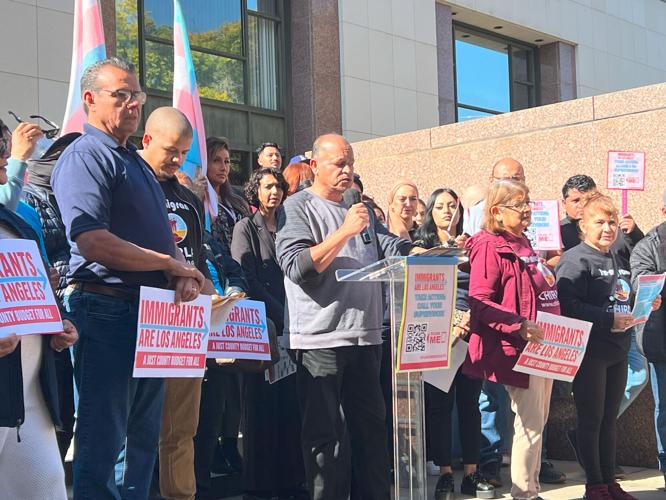
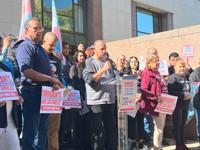
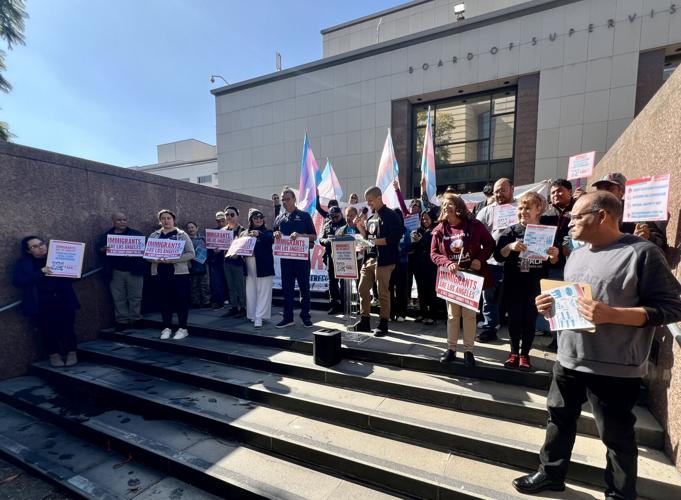
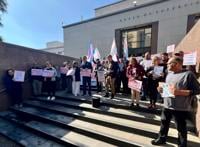

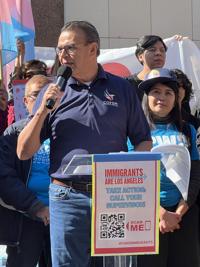
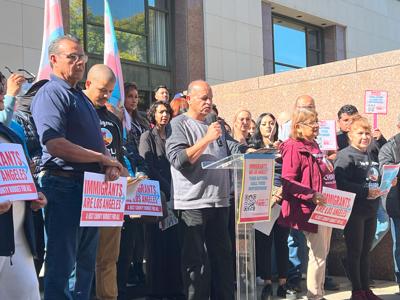








(0) comments
Welcome to the discussion.
Log In
Keep it Clean. Please avoid obscene, vulgar, lewd, racist or sexually-oriented language.
PLEASE TURN OFF YOUR CAPS LOCK.
Don't Threaten. Threats of harming another person will not be tolerated.
Be Truthful. Don't knowingly lie about anyone or anything.
Be Nice. No racism, sexism or any sort of -ism that is degrading to another person.
Be Proactive. Use the 'Report' link on each comment to let us know of abusive posts.
Share with Us. We'd love to hear eyewitness accounts, the history behind an article.